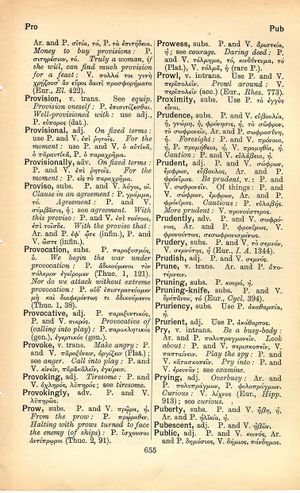proviso
Πάντα ταῦτα ἐπείρασα ἐν τῇ σοφίᾳ: εἶπα Σοφισθήσομαι, καὶ αὐτὴ ἐμακρύνθη ἀπ' ἐμοῦ· κτλ. (Εcclesiastes 7:23f., LXX version) → I tried to give proof in wisdom of all those things; I said, I will be wise, but that wisdom was far from me ...
English > Greek (Woodhouse)
subs.
P. and V. λόγοι, οἱ. Clause in an agreement: P. γράμμα, τό. Agreement: P. and V. σύμβασις, ἡ; see agreement. With this proviso: P. and V. ἐπὶ τούτοις, ἐπὶ τοῖσδε. With the proviso that: Ar. and P. ἐφʼ ᾧτε (infin.), P. and V. ὥστε (infin.).
Latin > English (Lewis & Short)
prōvīsō: adv., v. provideo
I fin. B.
prō-vīso: ĕre, v. n. and
I a., to go or come forth to see (ante-class.): proviso, quid agat Pamphilus, Ter. And. 5, 5, 1: huc proviso, ut, ubi tempus siet, Deducam, id. Eun. 3, 1, 4; id. Ad. 5, 6, 1 (proviso duas res significat: procedo et video, Don.).—With acc.: si quem hominem exspectant, eum solent provisere, to be on the lookout for him, Plaut. Stich. 5, 1, 2.
Latin > French (Gaffiot 2016)
(1) prōvīsō, adv., v. provideo, fin.
(2) prōvīsō, ĕre, [seult au prés. et au futur]
1 intr., s’avancer pour voir, pour s’informer : Ter. Andr. 957 ; Eun. 394
2 tr., aliquem, s’avancer pour voir si qqn vient : Pl. St. 642 ; 644.
Latin > German (Georges)
prō-vīso, ere, hingehen und nach etw. sehen, nachsehen (s. Spengel Ter. Andr. 957 u. Spengel u. Dziatzko adelph. 889), provisam, quam mox vir meus redeat, Plaut.: huc ad vos proviso, quam mox virginem accersant, Ter.: proviso, quid agat, Ter.: huc proviso, ut etc., Ter.

